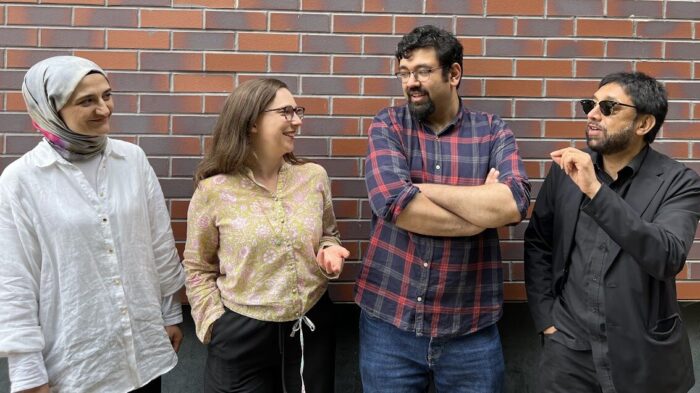University of Leeds Teaching Awards 2024 Winners
Explore the profiles of our award winners and discover more about the work, innovation and impact recognised in the 2024 University of Leeds Teaching Awards.

For additional details about the awards, visit our main teaching awards page or view the announcement of the 2024 winners.
Early Career Excellence Winners
Dr Jo Brown
Dr Jo Brown – School of Food Science and Nutrition, Faculty of Environment
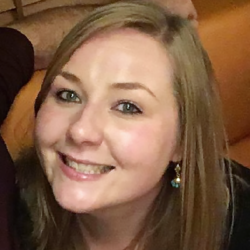
Dr Jo Brown is a Teaching Fellow in the School of Food Science and Nutrition. She is a Leeds graduate and completed her Unilever-sponsored PhD in 2013. After gaining industrial experience, Jo rejoined the University in 2015 as a Teaching Laboratory Technician where her role quickly evolved to become the academic link between module leaders and technical staff.
Jo’s pedagogical practices focus on helping students connect theory-based lectures with practical observations and develop essential skills and confidence in applied practical settings. She aims to foster collegiate, interactive and supportive learning environments where student experience takes centre stage. Jo’s dedication to practical applications has led her to become a LITE (Leeds Institute for Teaching Excellence) fellow looking at the Future of Taught Laboratory Spaces. She is particularly interested in the impact of digitalisation on taught laboratory practices and how it affects the usage of current laboratory spaces.
Since becoming a Teaching Fellow, Jo has continued to develop her vision of creating meaningful learning experiences. This has led her to explore co-creation where she has actively involved students and staff in teaching designs to keep content relevant and engaging. As part of her curriculum redesign, she is currently looking at ways that the Language Centre and Food Science can collaboratively create taught modules at MSc Level.
In addition to her teaching, Jo is committed to educational outreach and is the Outreach Lead for her school. She frequently delivers both on campus and in school taster sessions to promote Food as a scientific subject area as well as leading the UK-wide @UKFOODSCEINCE group.
Winning an Early Career Excellence Teaching Award is a true honour. I am passionate about the teaching that I do and being recognised for my practices at this early stage in my career is incredibly motivating. It has boosted my confidence, encouraging me to continue making a positive impact on both staff and student experiences.
Dr Arjun Khara
Dr Arjun Khara – School of Design, Faculty of Arts, Humanities and Cultures
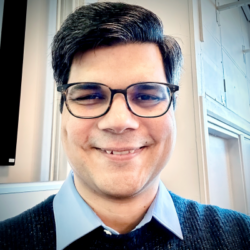
Dr Arjun Khara is a lecturer and Deputy Head of the School of Design. He is also a co-investigator on an EPSRC-funded project for artificial intelligence and data visualisation. His field of investigation is digital and information design, focusing on AI as creator, collaborator, and companion. Arjun received his PhD from the University of Reading in 2022, the year he joined Leeds. He was appointed Deputy Head of School in 2023 and will lead the BA Art and Design degree programme from September 2024. Before coming to the UK, he worked in Singapore and Southeast Asia as a communications and digital design consultant.
Arjun’s work connects philosophies of fairness and care aesthetics with design applications. His research centres on how people make meaning of systems, information, and interactions through active appreciation of care and other-regarding approaches, and why such approaches are inseparable from design decisions and processes. This has led Arjun to re-imagine the relationships between care aesthetics and design pedagogies as a fundamental way to engage learners on multiple levels. He does this by drawing his students’ attention to the specialness of everyday lived moments as opportunities for elevated learning experiences.
Arjun is also a programmer; coding, AI, and animation therefore feature in his classroom activities as practical elements within frameworks of wider philosophical thought. Arjun formed the Artificial Intelligence Working Group (AIWG) at the School of Design, and is the Associate Director (Business) at the School’s CPD and executive education arm. He additionally mentors staff, and supervises on bachelors, masters, and PhD programmes.
In 2024, Arjun became the recipient of both, the AHC faculty, and the university-wide LUU Partnership Awards for Teacher or Supervisor of the Year.
It is an incredible feeling winning an Early Career Award for teaching from the University of Leeds, an institution brimming with so many educators whom I deeply respect and admire. It’s still sinking in, but the award truly reaffirms my approaches to student education. Indeed, what matters most to me is helping my students visualise and voice their aspirations as tomorrow’s leaders, and it is to them that I dedicate this achievement.
Dr Manoj Ravi
Dr Manoj Ravi – School of Chemical and Process Engineering, Faculty of Engineering and Physical Sciences
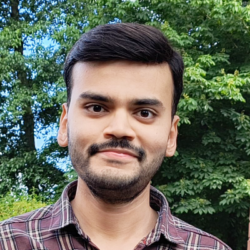
Dr Manoj Ravi is a Lecturer in Chemical Engineering in the School of Chemical and Process Engineering. He obtained his PhD in heterogeneous catalysis from ETH Zurich, Switzerland, and joined Leeds as a Curriculum Redefined transformative educator in 2022.
Manoj is a Fellow of the Higher Education Academy (FHEA) and the University teaching award recognises his contributions in diverse areas in the teaching and pedagogic research space spanning curriculum design, active learning, authentic assessments, sustainability, and artificial intelligence. As a member of the University’s Sustainable Curriculum project team, he explores strategies to embed sustainability in the curriculum and contributed a guidance article to the Sustainability Toolkit published by the Engineering Professors Council. Furthermore, Manoj centralises student wellbeing and belonging in his teaching and scholarship practice. As part of this, he works closely with student success and outreach initiatives, besides engaging in externally funded projects on student partnership and sense of belonging.
Manoj is also a Fellow of the Leeds Institute for Teaching Excellence. In this capacity, he investigates ways to close the gap between student assessment practice in higher education and actual professional practice. In addition, given the growing emphasis on synoptic assessments, he explores the design of learning activities that promote synoptic learning. By extension, Manoj is also interested in the constructive use of artificial intelligence in the higher education sector and leads a University-wide interdisciplinary project working with University staff, students and employers.
I am honoured to have been distinguished with this award! From my childhood, teaching and education was something that always fascinated me. Hence, to be working in my role as a transformative educator is a dream come true already. And then to have the University recognise my work through this award makes it doubly delightful! This award is a reminder of the great privilege that I enjoy as an educator to transform student learning and their evolution at University. I would like to thank my students and colleagues, without whom, this award wouldn’t have been a reality.
Sustained Excellence Winners
Dr Catherine Bates
Dr Catherine Bates – Lifelong Learning Centre, Professional Services
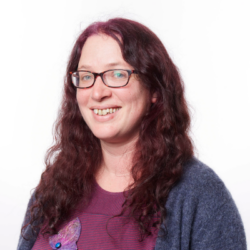 Catherine Bates has led BA Professional Studies – an interdisciplinary degree designed for mature students – in the Lifelong Learning Centre (LLC) since 2015, and is the School Academic Leads for Inclusive Pedagogies (SALIP) for LLC.
Catherine Bates has led BA Professional Studies – an interdisciplinary degree designed for mature students – in the Lifelong Learning Centre (LLC) since 2015, and is the School Academic Leads for Inclusive Pedagogies (SALIP) for LLC.
Catherine obtained her PhD in Canadian literature at Leeds in 2006. Simultaneously, she trained and worked as a Dyslexia Support Worker in HE, also teaching adult education classes for the Workers’ Educational Association (WEA). She then taught at the Universities of Leeds, Birmingham, Huddersfield and Keele, and continued with the disability strategy tutor work for 8 years. These opportunities to work with a wide range of students ignited her passion for inclusion and for recognising the strengths and contributions mature and neurodiverse students bring to HE institutions. She also gained insight into the significant disadvantages these – and other students marked as different – can experience in accessing and thriving in HE. This informs her strengths-based, person-centred approach to both teaching and admissions.
This award recognises Catherine’s leadership in relation to the inclusive admissions, curriculum design and pedagogical approach on the BA Professional Studies degree; and to disseminating LLC good practice and sharing her expertise with colleagues across the institution. She leads a programme-level approach to embedding academic literacies, authentic assessment, and student-centred participatory pedagogies which has enabled students to experience transformation and empowerment; see this example of an amazing graduate. She takes a collaborative approach to leading on inclusion in the LLC, co-designing an Inclusive Learning and Teaching SharePoint site, setting up a multi-disciplinary Inclusion working group, and finding opportunities to shine a spotlight on the excellent inclusive practice in the LLC. Examples of this can be read in an article on the TIPS Blog exploring authentic assessment in LLC and a Medium article looking at what makes teaching and learning practices inclusive.
Catherine is one of 11 facilitators training colleagues across the institution to write inclusive Competence Standards and has contributed to a panel discussion at the 'Perceptions of Inclusive Pedagogies' Student Success forum with her students. Together with three students, she has co-authored a chapter for the forthcoming book 'Stories of Hope,' which explores the transformative impact of returning to education on these students, their families, communities, and HE. She is currently involved in a collaborative participatory research project about Mature Student Capitals with LLC colleagues.
I feel humbled and delighted, in equal measure, to receive this recognition; I share it with my wonderful LLC colleagues and students who continually inspire me and urge me to work at ensuring all students have a transformative educational experience – and that includes the opportunity to transform the institution. Inclusion is a continual relational process we are all part of and have a stake in – I am so lucky to be able to learn, every day, from my amazing Professional Studies students and the courage and unique perspectives and insights they bring to the institution. They push me to be the best teacher and leader I can be.
Sofia Martinho
Sofia Martinho – School of Languages, Cultures and Societies, Faculty of Arts, Humanities and Cultures
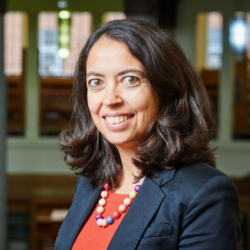
Sofia Martinho is an Associate Professor of Portuguese in the School of Languages, Cultures and Societies. She joined the University of Leeds in 2008, where she is currently the Director of Spanish, Portuguese and Latin American Studies and the Director of the Camões Centre for Portuguese Language.
She obtained a BA (Hons) in Modern Languages and Literatures at the University of Coimbra (Portugal), and then completed a PGCE in Didactics of Language. In 2013, she completed an MA in Education, with a thesis on Digital Literacies. Sofia’s scholarship focuses in the areas of language pedagogy and digital approaches to language learning and teaching, with a particular focus on developing fluency in language learning and internationalisation. Her most recent student education venture is a Collaborative Online International Learning (COIL) project, to enhance students’ language learning and develop engaged global citizens through virtual mobility.
Sofia has been a leading figure in her area of expertise both within the University of Leeds and beyond. Her initiative and leadership were pivotal in creating The Language Scholar, an innovative international journal dedicated to the Scholarship of Teaching and Learning (SoTL) in Language Education, which helped initiate and develop a culture of scholarship in her School, inspiring colleagues to start their own scholarly journey in Language Education. She is also the co-founder and President of TROPO UK, the Association of Researchers and Teachers of Portuguese Language. TROPO UK is the leading platform for sharing best practice and discussing SoTL in Portuguese Language Education.
Committed to staff professionalisation, Sofia has pro-actively organised conferences, CPD sessions and training days for language educators, and as a dedicated advocate for language learning in the UK, she frequently leads outreach and policy-related activities.
It’s an incredible honour to receive this award. Learning and teaching have been my passion for many years and student education is central to my academic identity. I feel privileged to work at Leeds, such a supportive environment for those of us dedicated to improving the student journey. My pedagogy strives to empower language students to develop their confidence and broaden their horizons. I truly believe that languages play a vital role in the development of open-minded global citizens. I look forward to many more years working to improve language pedagogy together with colleagues and students, and I hope this award gives visibility to the important work of all language practitioners.
Rachael O’Connor
Rachael O’Connor – School of Law, Faculty of Social Sciences.
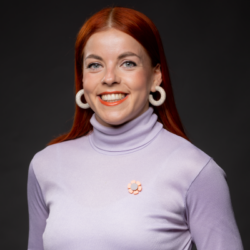 Rachael O’Connor (she/her) is a graduate of the University of Leeds (LLB Law and Accounting, 2013). She is now an Associate Professor in Legal Education, University Academic Lead for Personal Tutoring, Leeds Institute for Teaching Excellence Fellow, Michael Beverley Innovation Fellow and Senior Fellow of the Higher Education Academy. Now a non-practising solicitor (formerly a corporate lawyer in an international law firm), Rachael is also a trustee of legal mental health and wellbeing charity, LawCare.
Rachael O’Connor (she/her) is a graduate of the University of Leeds (LLB Law and Accounting, 2013). She is now an Associate Professor in Legal Education, University Academic Lead for Personal Tutoring, Leeds Institute for Teaching Excellence Fellow, Michael Beverley Innovation Fellow and Senior Fellow of the Higher Education Academy. Now a non-practising solicitor (formerly a corporate lawyer in an international law firm), Rachael is also a trustee of legal mental health and wellbeing charity, LawCare.
Rachael comes from a working-class background and was the first generation in her family to attend university. This contributes towards Rachael’s passion for improving experiences and opportunities (now and in the future) for under-represented students and amplifying collective voices of under-representation as a teacher, personal tutor and researcher.
Rachael’s research focuses on developing authentic relationships between students and staff through reverse mentoring, within higher education (HE) and beyond. She has won prizes internally and externally for this sector-leading work, including a Faculty Partnership Award for Equality and Inclusion, the Association of Law Teachers’ Stan Marsh Prize and Annual Seminar Prize and a Kindness in Education Award. Rachael has published many papers on reverse mentoring in international legal and HE journals, as well as delivering a TedX talk and regularly advising external partners on reverse mentoring.
Rachael’s work has seen students from a range of under-represented backgrounds, across disciplines, developing their lived experience expertise, mentoring teaching staff, student support staff, personal tutoring leads, campus police liaison officers, senior executives/leaders and legal professionals. Rachael works with Educational Engagement colleagues to deliver a University-level reverse mentoring scheme, now embedded into core Access and Student Success work. Hundreds of staff, students and external partners have benefitted in diverse ways from participating in these projects.
Rachael is currently co-authoring a book on supporting working-class students, building on mentoring and tutoring work she delivered with Plus Programme students and listening rooms activities undertaken with working-class students, as well as her role on the Staff Working-Class Network’s organising committee. Rachael has collaborated with many student research assistants, advisory boards, interns and consultation teams who identify as under-represented at university across her research who have gone on to win their own awards from HE bodies, begin funded PhDs, receive job offers and take on further research and experience opportunities, utilising their reverse mentoring experiences to continue on their own success journeys.
Rachael is currently leading an institutional-level review and consultation on academic personal tutoring to further develop this core student support offering, utilising her reverse mentoring findings to inform strategic progress in student education at Leeds.
Whilst I am super happy to receive this award for sustained excellence in my educational practice at Leeds over the last six years, I have to acknowledge that there is no way I could have done this work without all of the wonderful students, colleagues and external partners who have collaborated with me along the way. Reverse mentoring and other equity and inclusion work relies on people who already feel they are at the margins of higher education and other sectors such as the legal profession sharing their stories and lived experience expertise with me and others. I do not take this privilege lightly. Thank you for trusting me. Your stories are always with me and a reminder to keep doing better, every day, as well as encouraging others to do the same. This award is for all of us as a special recognition of the work we have done and the things we have achieved together. However, we still have a lot to do, particularly in the space of equity and inclusion. This is a task we must all be part of. I really look forward to continuing this important work with our student and staff community in the years to come.
Dr Martin Ward
Dr Martin Ward – School of Languages, Cultures and Societies, Faculty of Arts, Humanities and Cultures
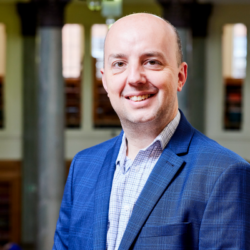 Dr Martin Ward is an Associate Professor of Chinese and Japanese Translation in the School of Languages, Cultures and Societies. He is the Faculty of Arts, Humanities, and Culture's academic lead for Global Campus Experience, Experiential Learning lead for Collaborative Online International Learning (COIL), and current LITE fellow, exploring internationalising student education at Leeds through embedding COIL.
Dr Martin Ward is an Associate Professor of Chinese and Japanese Translation in the School of Languages, Cultures and Societies. He is the Faculty of Arts, Humanities, and Culture's academic lead for Global Campus Experience, Experiential Learning lead for Collaborative Online International Learning (COIL), and current LITE fellow, exploring internationalising student education at Leeds through embedding COIL.
A graduate of the University of Leeds (BA Chinese and Japanese Studies), Martin gained his PhD in Asian Culture from Hiroshima University. Returning to his alma mater in 2017 with a determination to provide excellent and innovative learning experiences for students at Leeds, Martin has been recognised for his innovative practice in identifying developmental needs in students of translation through interactions with people beyond their own institution and discipline. Achieving demonstrable impact in this respect, he is also recognised for demonstrating clear leadership in translating this approach into other fields.
An overseas expert of the Translators’ Association of China (TAC), Martin is also a published translator of wartime Japanese military documents and books on Chinese political discourse, such as the centennial The Communist Party of China: A Concise History (chapters 7 & 8) amongst others. He is also often invited keynote speaker for translation studies conferences and lectures in China, Japan, and elsewhere. In 2020, he founded the East Asian Translation Pedagogy Advance (EATPA) network, bringing together academics around the world teaching the translation of Chinese, Japanese and Korean. Together with other colleagues he recently also founded the East Asian Translation research satellite of Language at Leeds.
A former joint chief editor of the Language Scholar journal, Martin has also published his research in The Translator and is one of the editors on two upcoming volumes with Routledge.
I am absolutely delighted to win this award. It’s always wonderful to see students at Leeds enjoying and benefitting from collaborating with their peers overseas. Providing inclusive global study opportunities is part of the institutional strategy and I’m excited to see the University supporting the development of collaborative online international learning. This award inspires me to continue to pursue engaging, inclusive pedagogies to help prepare our students for their future lives and careers.
Early-Stage Collaborative Excellence Winners
Dr Joanna Brown, Buena Galleposo, Professor Charlotte Haigh, Maedeh Hassani, Eleanor Jones-Ford, Iria Lopez, Thu Thu Naing and Stuart Porteous
Team members: Dr Joanna Brown, Buena Galleposo, Professor Charlotte Haigh, Maedeh Hassani, Eleanor Jones-Ford, Iria Lopez, Thu Thu Naing and Stuart Porteous – Digital Education Service/School of Biomedical Sciences, Professional Services/Faculty of Biological Sciences.
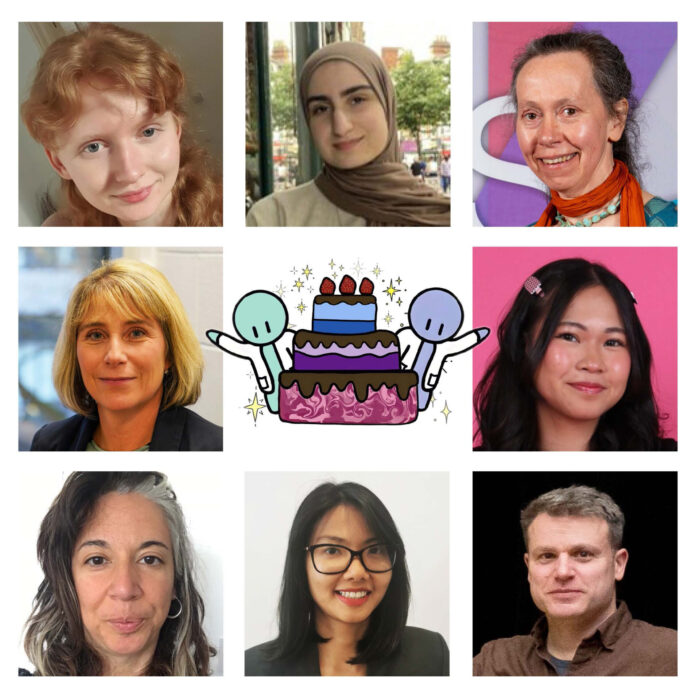
Top row (L to R): Eleanor Jones-Ford, Maedeh Hassani, Dr Joanna Brown, Middle row (L to R): Prof. Charlotte Haigh, Buena Galleposo, Bottom row (L to R): Iria Lopez, Thu Thu Naing, Stuart Porteous.
The team is diverse and multi-faceted, consisting of staff and students from a range of roles in three faculties and two services. Eleanor and Maedeh are students in the Faculty of Biological Sciences. Joanna, Stuart, Buena and Thu are learning technologists in the Faculty of Biological Sciences, Business School and Faculty of Environment. Charlotte, from the School of Biomedical Sciences (SBMS), is Dean for Student Education: Educational Enhancement and Student Experience, and Iria is a design professional working with the Learning Design Agency (LDA).
The team grew as it progressed through the stages of a design thinking process. It started with a discovery phase that fed into a two-day design sprint for SBMS staff. The sprint included building empathy for students, identifying problems, and generating and prioritising ideas. Iria, Charlotte and Joanna were involved in this stage. The second stage, over the following six months, involved prototyping, testing and implementing the ideas that arose in the sprint. During this stage, Charlotte briefed the student interns (Eleanor and Maedeh) who created a novel storyboard for an animation. Joanna used the storyboard and feedback from students to guide the team and bring on board other experts from the Digital Education Service (Stuart, Buena and Thu).
The delightful resources created by the team (an animation and infographics) have demystified synoptic assessment for new students beginning the reimagined programmes in SBMS. These resources have supported the first-year undergraduates (approximately 300 students) in their understanding of the five BSc/MBiol programmes in SBMS. They were available for new students in October 2024 and will go on to be used with new students in future years.
After engaging with the resources, the learners:
- understand how their programme will be structured and assessed
- know more about what to expect during the first year of their degree
- know how to approach their studies
- feel welcomed into the school in an engaging, accessible and friendly way
By students and staff co-creating, pooling skillsets, stretching themselves, training and supporting each other, and making clever use of their limited resources, the team went way beyond the original brief and expectations. The resulting resources have welcomed and enlightened new students on the reimagined degree programmes in the School of Biomedical Sciences.
The team’s work has been presented at six conferences to date and looking ahead to the future, they said, "We are looking forward to exploring how this way of working can be developed. The whole (team) is without a doubt greater than the sum of the parts (individuals)."
Links:
- Synoptic assessment with cake animation
- Digital Education article: Design thinking, synoptic assessment and cake
- Assessment matters article: Formative and summative assessment in the Year 1 curriculum in Biological Sciences
The team are thrilled to have won this award. We hope that it will inspire others to explore the potential of student-staff co-creation, cross-faculty teamwork, design thinking and innovative ways of communicating with students. It would be great to see more opportunities for staff to co-create with students.
– Dr Joanna Brown, Senior Learning Technologist
I am very proud of what we've created. Alternative ways of communicating are hugely valuable, especially when it means information becomes more accessible and engaging as seen with this animation. It has been a privilege to work on such a dynamic project. I cannot wait to see the impact it has on how universities engage with their students in the future. Both in terms of utilising different methods of communication but also hopefully more student-staff collaboration.
– Eleanor Jones-Ford, student
Creating the storyboard and script and watching it transform into an animation over such a short space of time has been an incredibly rewarding experience. I've learned and gained so much throughout the entire process! It’s been very fulfilling to see the success of the project and it shows the importance of using the unique insight offered by students to understand the wider needs of the student community.
– Maedeh Hassani, student
We were inspired by the innovative nature of the project. Working across faculties in a truly collaborative way allowed us to bring together our unique perspectives and skill sets, resulting in a richer and more impactful final product. It was a pleasure to be part of such a groundbreaking initiative that showcases the power of cross-disciplinary.
– Buena Galleposo and Stuart Porteous, Learning Technologists
Johanna Loock, Ayse Rumeysa Kotan, Dr Hizer Mir and Professor Salman Sayyid
Decolonial Module Development in Sociology
Team members: Johanna Loock, Ayse Rumeysa Kotan, Dr Hizer Mir and Professor Salman Sayyid – School of Sociology and Social Policy, Faculty of Social Sciences
It was crucial to the team’s vision of “Formations of Coloniality and Modernity” that it is a core module at the beginning of our level 1 students’ journey. As a student commented, “It’s a good way to make us think through the lenses of colonialism, decolonialism and modernity from the start.” (2023/24).
With this approach, the team wanted to ensure that the module shifted away from an additive approach in which topics such as gender, race, or disability are considered marginal to traditional Sociology and its key thinkers, often consigned to the tail end of a semester.
They designed the module to expand the ‘diet of examples’ by which their students understand the social world. “Formations of Coloniality and Modernity” demonstrates the continuing impact of the legacy of colonialism on what they teach and not only on how they teach. By challenging Eurocentric approaches through decolonising the curriculum, this module supports students in becoming critical thinkers while enhancing their understanding of increasingly diverse societies. Student testimonies evidenced the transformational impact of the module and recognised it helped meet their demands for less Eurocentric and more globally inclusive ways of understanding the world: “I liked how it proved how Eurocentric the world is, I never thought about it that way before.” (2022/23).
The collaboration
It takes the work and commitment of a larger team to achieve the success of the implementation and development of a decolonial module such as “Formations of Coloniality and Modernity”, which has only been possible thanks to the contributions of many colleagues in the School of Sociology and Social Policy.
The sustained collaboration between Professor Salman Sayyid, Dr Hizer Mir, Johanna Loock, and Ayse Rumeysa Kotan sought to rethink, design and develop what was initially called “Formations of Modernity” into a decolonial module “Formations of Coloniality and Modernity” over three years. Rather than an event, this collaboration has been a process which started with co-teaching in 2021, and significantly developed and solidified through a summer working group in 2022, the work of which continued in the following years with the analysis of student and peer feedback, the adaptation of content and teaching-style, and expanding the discussion on decolonising approaches through the participation in the ‘Pedagogies for New Times Conference’ (2023). As a team, they aimed to render learning and teaching inclusive, global, and academically challenging in terms of both content and pedagogic practice. Therefore, the collaboration involved the development of innovative approaches to seminar tasks, teaching methods, assessment, and use of technology.
This team was a blend of senior staff, early-career academics, and teaching assistants, each contributing their specific experiences and skill sets to the module design process. While all team members share a commitment to decolonising (the curriculum), they contributed different perspectives to the collaboration from international and minoritised backgrounds and different research specialisations and disciplinary backgrounds.
Meet the team:
Ayse Rumeysa Kotan is a PhD student in the Department of Sociology and Social Policy at the University of Leeds. She earned her BA in Philosophy from Hacettepe University in Turkiye and her MA in Philosophy of Education from UCL Institute of Education. Her current research focuses on the decolonisation of education and is a theoretical discussion of the transformation of Muslim subjectivity through education. She worked as a teacher in Turkiye and as a Teaching Assistant at the University of Leeds.
Johanna Loock is a Lecturer in Sociology and Social Policy at the University of Leeds. However, she started contributing to the teaching and developing of “Formations of Coloniality and Modernity” as a Teaching Assistant. Johanna has a background in Islamic Studies, Geography, Religious Studies, Political Science, and Sociology and has studied at universities in Switzerland, Germany, the US, and the UK. She is a member of the editorial collective of the ReOrientations Blog.
Dr Hizer Mir joined the University of Leeds in 2008 for his undergraduate degree and, with the exception of his Masters year, has been based at Leeds since. After working at the LifeLong Learning Centre at the University of Leeds during his PhD, he joined the School of Sociology and Social Policy in 2019 as a Teaching Fellow. In 2021, Hizer became a Lecturer in Sociology and Social Policy at the University of Leeds. He is currently a co-host of the Radio ReOrient podcast, and his interests include critical Muslim studies, religion and secularism, the alt-right and popular culture.
Professor Salman Sayyid is professor of decolonial thought and social theory at the School of Sociology and Social Policy, where he was Head of School from 2017-2023. His research and publications focus on decoloniality and historical sociologies. He is the founding editor of the interdisciplinary academic journal ReOrient.
As a team, we are especially delighted to have won the Early-Stage Collaborative Teaching Award because it recognises the necessity of embedding decolonial content not only as a pedagogic practice but also as a substantive topic. It has been a pleasure to work together and to see our ideas for a decolonial module both come to life in the classroom and also be appreciated by students and the University. We hope the university continues to promote and prioritise decolonisation, whether led by staff or students.
Sustained Collaborative Excellence Winners
Dr Aline Gaus, Alison Murfin, Dr Helen Morley and Dr Rachel Haworth
Building the TIPS Community of Practice
Team members: Dr Aline Gaus, Alison Murfin, Dr Helen Morley and Dr Rachel Haworth – Organisational Development and Professional Learning (OD&PL), Professional Services
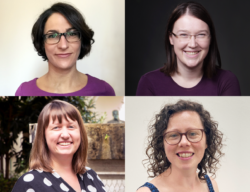
Top row: Dr Aline Gaus, Dr Helen Morley. Bottom row: Dr Rachel Haworth and Alison Murfin
‘Teaching, Innovation and Practice in Student Education’ (TIPS) is a series of activities designed to support staff in teaching-focused roles in enhancing and transforming the student learning experience. At its heart sits a community of practice on MS Teams, open to all staff and PGR students who teach at the University of Leeds. Since June 2020, nearly 900 members have joined the TIPS Community, which now reaches approximately a third of staff in teaching roles at the University of Leeds.
TIPS was conceived and is currently run by Aline Gaus, Alison Murfin, Helen Morley and Rachel Haworth from Organisational Development and Professional Learning (OD&PL). Working collaboratively as a team, alongside community members and key stakeholders across the institution, they have successfully developed a flourishing space for mutual support and collaborative learning, which has fast become a “one-stop shop for all things innovative practice”, according to a member.
Between 2020 and 2024, the TIPS team has run more than 60 events with over 100 partners and published 50 peer-reviewed articles on the TIPS Blog.
TIPS’s impact is threefold:
- Supporting individuals to learn, innovate and share practice, develop their identities as scholars, and gain a sense of belonging;
- Creating links between practitioners to foster mutual support, collaboration opportunities and cross-fertilisation of ideas;
- Initiating culture change at the institution through careful modelling, tone-setting and providing space for alternative conversations;
Designed for teaching colleagues, TIPS has a positive impact on students through its members and plays a key role in fostering a sense of community among educators. Members noted:
- “I saw numerous examples of colleagues taking ideas from TIPS events and applying them effectively to their own practice. These included ideas around assessment, accessibility/inclusion, and learning technologies.”
- “It [helped] us feel we are not on our own in this.”
- “TIPS played a huge role in helping me develop a sense of belonging in the University.”
- “TIPS created a trusting, safe environment where we all could feel silly but safe together, learn together, progress together. Anybody can ask and answer, which is really important; it is one of the few places in the university that transcends hierarchy and allows anybody to be a novice or an expert.”
After winning AdvanceHE Collaborative Development Funding in a bid with 7 other universities in 2023, this Sustained Collaborative Excellence in Teaching Award adds to the recognition of the work of this team.
Meet the team:
Dr Aline Gaus is a Sociologist disguised as an Academic Development Consultant (OD&PL) who brings her research expertise in ritual, identity and community and 15 years of experience of teaching in HE to her role as TIPS Project Lead. Crafting this approach to educational development through community building, she has since led the development of TIPS by establishing collaborative links across both the University and the sector while building an evidence and impact-driven project.
Alison Murfin, Learning and Development Administrator and TIPS Blog Editor, designed workflow processes and development opportunities for authors and feedbackers. Alison brings her interest and skill in recognising the support needs of others, her project management expertise and experience in considering user journeys and experience to the TIPS Team.
Dr Helen Morley played a key role in establishing the community as Co-Lead. Bringing her extensive and varied skill set to the table, she was instrumental in setting the tone of the community, offering her facilitation skills to community events and TIPS team alike. Helen's expertise in building communities of practice and leading development initiatives continue to be fundamental to the continued success and momentum of TIPS.
Dr Rachel Haworth is an Academic Development Consultant in the Student Education Development team (OD&PL). She joined the TIPS team as interim Project Lead in 2022 and then stayed on as Co-Lead. She runs events and conversations specifically around assessment, competence standards, and pedagogy in physical spaces. To make sure these conversations are effective, she draws on her background as an established educator and researcher in UKHE.
We are delighted to win this award, to gain recognition for the project we started and want to celebrate the fantastic community of educators that helped build and grow TIPS. During the pandemic, we were all set adrift, and no one was building an ark. From the beginning, we conceived TIPS as a space for alternative conversations, with a focus on everyday practice, peer learning, mutual support and as a springboard into scholarship of teaching and learning for academics and non-academics alike. It is rare for professional services education-focused staff to be recognised for their excellent contributions to teaching and we are immensely proud to pave the way towards a change in culture, even just a little bit, by setting an example and supporting others in their development.
Tony Morgan, Dr Lena Jaspersen and Dr Sanaz Sigaroudi
Team members: Tony Morgan, Dr Lena Jaspersen & Dr Sanaz Sigaroudi – Management and Organisations Department, Leeds University Business School.
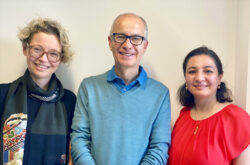
Left to right: Dr Lena Jaspersen, Tony Morgan and Dr Sanaz Sigaroudi
Tony, Lena and Sanaz work closely together to collaboratively design, teach and improve “innovation practice” modules which enable undergraduate and postgraduate students to develop work-ready skills highly valued by employers.
Based in the Leeds University Business School, the team works closely with colleagues across the University and a wide range of industry partners and experts to understand skills requirements and support student learning. The modules are interdisciplinary and teach students how to work in diverse teams and apply “design thinking” human-centred approaches to problem solving while working on real industry challenges.
The same human-centred approach is used by the teaching team. Emphasis is placed on understanding student needs and how different students learn. Student voice is captured through observations and verbal feedback in class, discussion boards, module evaluations, student reflective journals, assignment papers and alumni inputs.
The team design and improve their modules using pedagogical approaches including experiential learning, team-based activities and reflective learning. To maximise student engagement and enable an inclusive approach to team-based activities, the team has pioneered the use of “diverge-converge” activities. The pedagogic research they have carried out in this area has demonstrated very positive impacts, including for introverted students and for students where English is not their first language.
The wider impact of their teaching can be evidenced by consistently strong feedback from industry partners and students, including high student evaluation scores, student demand to enrol on the “innovation practice” modules and student and alumni feedback of how their teaching has provided practical benefits during graduate recruitment and at the start of their careers.
The team takes a systematic approach to sharing their knowledge. This includes sharing resources and advice with colleagues across the University of Leeds, undertaking pedagogical research including the Leeds Institute of Teaching Excellence I-DE-ES Project, writing textbooks including “Design Thinking for Student Projects”, speaking at internal and external conferences and collaborating with other universities and industry bodies.
Tony, Lena and Sanaz are currently working together to design and develop the changes required to enable further scaling up of student numbers for their existing modules, on a new MBA module to add to the portfolio and further dissemination of their research.
We are delighted to win this award and be recognised for the work we’ve carried out to develop and enhance learning opportunities for our students to develop skills highly valued by employers. We’d also like to take this opportunity to thank the many colleagues and industry partners who’ve supported us over the years and, most of all, our fantastic students, many of whom stay in touch with us long after their graduation. We look forward to expanding student numbers and further disseminating our work and research.
Dr Chris Randall, Dr Dimitra Mitsa, Professor Aysha Divan, Dr Sian Estdale, Dr Michelle Scott and Andy Gibbs
The Biopharmaceutical Development MSc, formed in 2016, is a collaborative effort between the University of Leeds (Faculty of Biological Sciences) and Labcorp, a leading global life sciences contract research company. This partnership addresses an industry-wide skills shortage by providing a pipeline of talented graduates equipped with industry-relevant knowledge and experience. The team includes Dr Dimitra Mitsa, Dr Chris Randall, Professor Aysha Divan, Dr Sian Estdale, Dr Michelle Scott, and Andy Gibbs, who brings a wealth of expertise from both academic and industrial backgrounds.
Biopharmaceutical Development is an innovative programme that challenges students to think creatively, solve problems from interdisciplinary perspectives, and develop strong communication and teamwork skills. It offers a combination of interactive sessions, industry site visits, and work-based learning. Students can choose between a one-year full-time course or a 20-month programme with a 12-month guaranteed paid industry placement. Assessments mimic real industrial scenarios, preparing students to excel in their careers.
The success of the programme is evident in its impressive employment rates, with 95-100% of graduates securing full-time employment or PhD training upon graduation. The programme has received excellent evaluations from external examiners and has been recognised twice with the prestigious Princess Royal Training Award. The collaborative approach, involving high levels of teaching by industry professionals, has been instrumental in achieving these outcomes.
The team comprises:
- Dr Dimitra Mitsa: Programme Lead MSc Biopharmaceutical Development, School of Molecular and Cellular Biology, University of Leeds.
- Dr Chris Randall: Director of Student Education, School of Molecular and Cellular Biology, University of Leeds.
- Professor Aysha Divan: Pro Dean for Student Education, Faculty of Biological Sciences, University of Leeds.
- Dr Sian Estdale: Head of Scientific Affairs, Labcorp, and Visiting Lecturer, University of Leeds.
- Dr Michelle Scott: Vice President and Head of Discovery and Biotechnology Solutions, Labcorp, and Visiting Lecturer, University of Leeds.
- Andy Gibbs: Director Drug Development and Regulatory Strategy, Labcorp, and Visiting Lecturer, University of Leeds.
Winning the University of Leeds Teaching Award for Sustained Collaborative Excellence is a testament to the dedication and innovative spirit of our team. It recognises our commitment to enhancing student learning experiences and bridging the gap between academia and industry. This award will further inspire us to continue developing transformative educational practices that prepare our students for successful careers in the biopharmaceutical industry.

